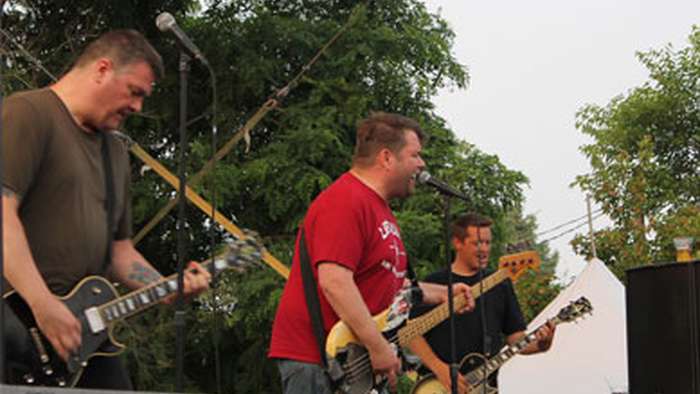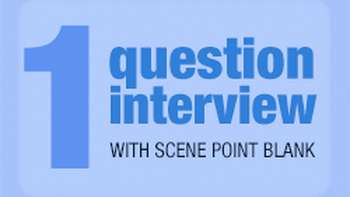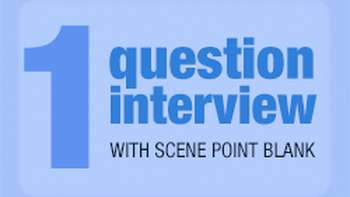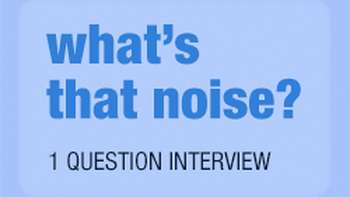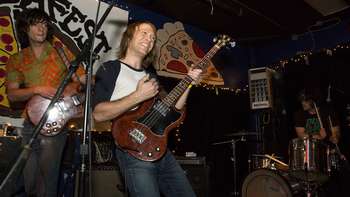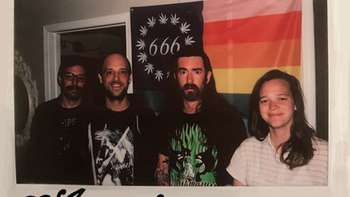
Paddy Costello: Our first 7” got distributed by Profane Existence just because we were all friends in the same scene. We went on tour and, in particular, I remember one show we played in Olympia, WA.
We played with Assuck for sure, I can’t remember who else, and on the flyer it was our name but in total crusty punk lettering -- not to say Profane are crusty -- and it said “from Minneapolis on Profane Existence.” I remember looking at that and thinking, “Oh no.” It was in a living room but there was a shit ton of people because Assuck was there. I remember shooting the breeze with a bunch of people and it was really cool. We’re talking about mutual friends, it’s cool, and then we get up there to play and we hadn’t even played the first chorus and we cleared that house. I think there was one passed out dude and a lady with her dog. We played maybe 5 songs and, eh, let’s shuffle off here.
Erik Funk: Even in ’98 when the LP came out, we did the record release show on a boat and we also played at The Whole as another record release show -- we weren’t doing First Avenue. We had done First Avenue.
Scene Point Blank: Weren’t you banned for a while?
Erik Funk: Yeah, that happened too.
Paddy Costello: That was earlier.
Erik Funk: None of the early Extreme Noise bands were playing First Ave or The Uptown Bar. It was all house shows. Then we started, every once in a while, to play here and there.
Paddy Costello: The first time we played the Main Room it was the first time we’d played First Avenue.
Paddy Costello: Felix Havoc had gotten a call that Down By Law was playing the Main Room. At that time there weren’t a lot of that kind of punk bands playing so they contacted Felix for Code 13 and he was like, “There’s this band Dillinger Four that’s a better fit, you should have them play too. “
I have to be honest with you. I look back on it: that show changed everything. Because that show was packed. It had nothing to do with us at all.
Erik Funk: But we sold a ton of 7”s.
Scene Point Blank: When was this?
Billy Morrisette: Late ’94- to early ’95. Because I wasn’t in the band yet.
Paddy Costello: The thing I remember about that show was that it was packed but we had nothing to do with it. But after that night, our draw tripled anything else we played.
Erik Funk: By ’98 and’99, house shows had become problematic. We were drawing more people than it was reasonable to have. That’s when we started doing more club shows.
Paddy Costello: We had different houses where people wanted us to play a show for friends from out of town but, “Will you play under a fake name because, to be honest with you, we don’t want to deal with how many people you’re going to draw and we don’t want to deal with certain people you’re going to draw.” It’s a cultural difference. It became a thing. After that, certain shows just didn’t happen. Not that they didn’t like us -- these were our friend -- we just don’t want to deal with that.

Erik Funk: Also in ’96, definitely ’97-98 is when we started playing with Lifter Puller a lot. It was a weird thing where we would do an all ages show and they would play with us. We’d play a late show with them, because they had more of a bar crowd. It was a brother band relationship. That was another thing that bridged us to all these other people in Minneapolis that were not aware of the Extreme Noise stuff, but they became aware of us because we played with Lifter Puller.
By 2000, the Versus God release show was in the Main Room and that was 1,500 people. By 2000 we could muster 1,500 for a record release show. That was our heyday, I guess: 1999-2000.
Billy Morrisette: That was definitely our most active period of touring and playing.
Lane: With 6 years between records it’s tough to maintain that. But with our next record coming out there’s been a fever. We’re at 8 years or something now.
Scene Point Blank: What led you to Hopeless? How did you get the national step?
Erik Funk: There were several labels.
Paddy Costello: We had talks about doing it ourselves. We had a grand debate in the woods of central New Jersey. We had two shows in the middle of New Jersey. We played a dude’s living room and we played a VFW Hall. I remember because it was right when Hopeless had got in touch with us. I look back and I was suspicious of the whole thing because I thought it was malarkey. I remember being, A) it’s a ska label, which is what I thought at the time. B) I don’t know: is this legit or is someone fucking with us because it seemed so out of left field.
Scene Point Blank: You didn’t know them personally?
Erik Funk: On those tours we were playing all kinds of places. We played in Great Falls, Montana. It was a house show.
Paddy Costello: We played there twice.
Erik Funk: This kid Seth put on the show. It wasn’t a notable show. It was a house show in Montana, it was nice. We had spaghetti, it was fun. But that kid had a distro and he would talk to Louis from Hopeless. And he sent Louis our 7” and was like, “Dude, this band is awesome,” or whatever. Just off that 7” Louis called us out of the blue. “I do Hopeless.”
Obviously we were aware of him but…They were a pretty polished label and had national distribution. We didn’t love all the bands on the label, but we didn’t hate them. It wasn’t exactly our scene but it wasn’t that far off. They could give us a couple thousand dollars to record, which was enough to make a record in what seemed like super luxury. It was a two record deal and we decided to go for it. And then, when we did it, all the sudden the label started getting a little cooler. All these bands: FYP, Scared of Chaka.
Billy Morrisette: Scared of Chaka being the bigger one.
Erik Funk: Later on, The Weakerthans and Selby Tigers. For a little while I felt like we tilted Hopeless, it was getting a little cooler. Years later we were in California at Hopeless and Louis was playing me this new band that he was super excited about and it was Thrice. At this point we were friends, I’ve known him for years and have a good relationship with him. “Dude, you’re joking, right?” This is nonsense to me. And then the joke was on me because they sold millions of records and that launched that label into a whole new stratosphere. That shows what I know.
By the time we were out of that contract and it was time for a new contract, Hopeless wasn’t the label it had started to be. At that time we had already started friendships with Fat and the people that worked there. Hopeless has a weirdo connection to Fat but Mike made it really clear: “I don’t want to step on Louis’ toes but whenever it’s reasonable, I want to make your records.” That’s how that happened.
[It all started with] this one kid, I haven’t seen him since.
Scene Point Blank: From my perspective it seems that was the first turning point. The first full-length and working with non-local people is a new level for a band.
Erik Funk: Hopeless, by and large, no complaints. The label taught us that’s it’s cool that a label can be run professionally: do shit when they say they’re going to do it, send you checks they say they’re going to send you. It set a standard for today: this is how it should be. It shouldn’t be all random and punk and who knows what you’re going to get. It doesn’t have to be that way.
Following an interruption for sound check.]
Erik Funk: [On to] on our next record. I skipped a lot in between.
Billy Morrisette: Versus God was a first for us because we went to Japan.
Erik Funk: We went to Japan with Discount. They invited us in 1999.
Paddy Costello: I remember we played “O.K. F.M. D.O.A.” at the first show and all these dudes were singing it phonetically and I’m thinking, “What the fuck? How do they know what anything is, much less this?”
Erik Funk: The first Japan tour we did 5 to 7 shows. It was probably the funnest tour ever. It was such a mind-blowing experience. D4 hadn’t been to Europe yet, but I had done it. We’d done a lot of touring in the US with other bands, but that was nuts. Almost every show was packed, some of them very packed. It was mind-blowing to us that people in Japan knew our records and were freaking out. It was one of those tours where we were the opener but we kind of ended up the headliner. That was the time where it felt that everything is working how it’s supposed to.
Billy Morrisette: I remember, ironically enough, on our flight to Japan there was another band on Hopeless on our same flight: Mustard Plug from Michigan. They were on the same flight and we had zero shows with them, none whatsoever. It was a completely separate tour.
